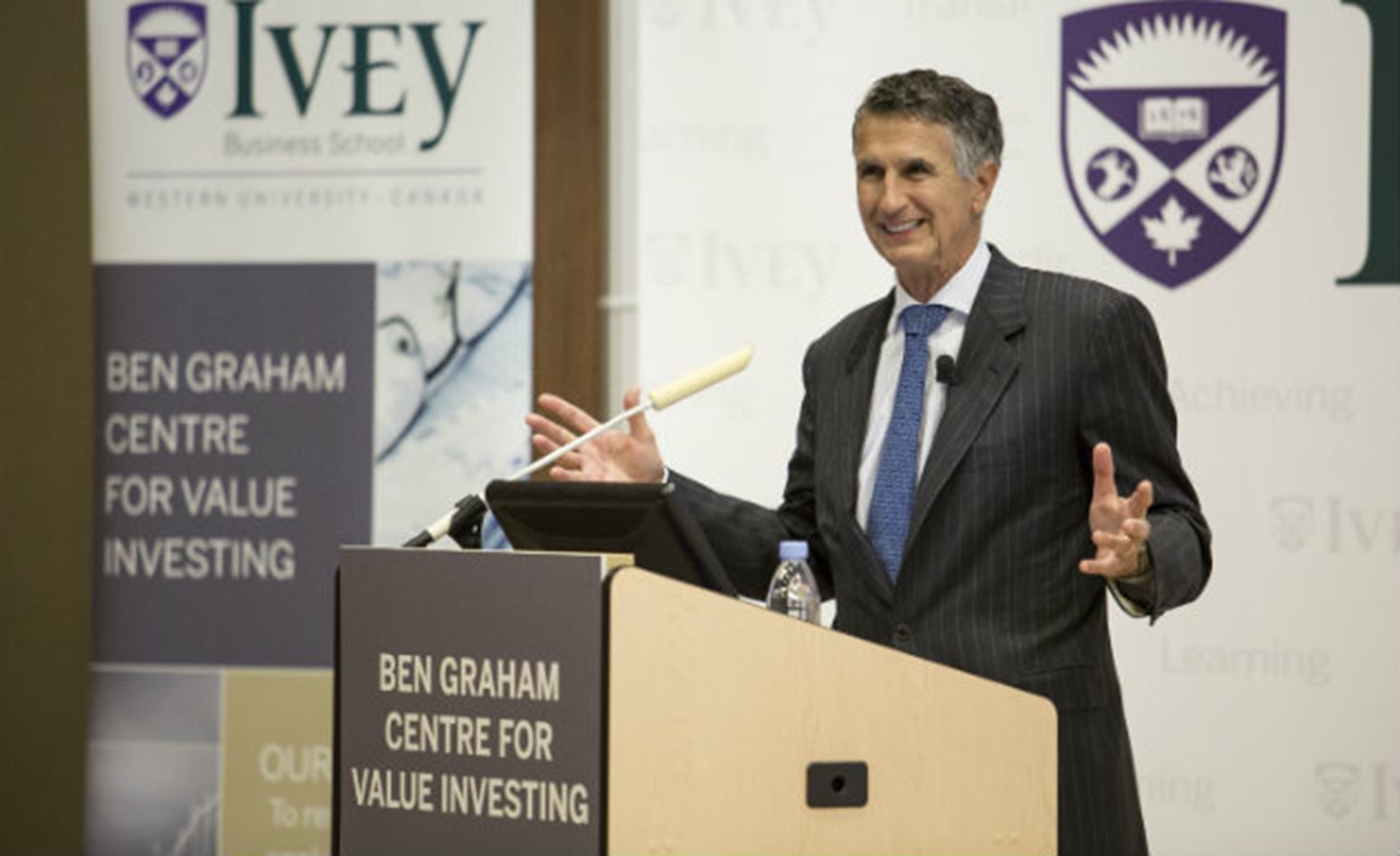Charles Brandes’s book on value investing, Brandes On Value: The Independent Investor, is aptly focused on the independent journey that value investors take.
That’s because value investors take the road less travelled, thinking about investments long term rather than aiming for short-term gains.
Brandes, Founder and Chairman of Brandes Investment Partners, an investment advisory firm that is headquartered in San Diego, Calif., spoke to students in Ivey Professor George Athanassakos’ value investing class on January 22 about what sets value investors apart from other investors. He cited their focus on finding companies that are built to last and have stock at bargain prices.
Brandes compared value investors to the small percentage of soccer goalies that stand still in the centre of the net, rather than move left or right, when trying to stop a penalty kick. Brandes said statistics show 94 per cent of the time goalies move right or left while trying to guess where the ball will go and they are correct about 25 per cent of the time. On the other hand, if they stand in the centre, they will likely stop the ball 60 per cent of the time. So why not stand in the centre and not move, if their odds of success are greater? Brandes said they fear being criticized for inaction.
“Investors, too, get severely criticized if they don’t do the new thing of the moment in putting together a portfolio and investments. They are criticized if they just keep it very simple and stick to fundamentals,” he said. “If you are thinking long term – thinking differently from everybody else – if you are standing in the middle, that’s where the success usually is. It’s a lot harder to stand there and do nothing.”
Brandes outlined how value investing differs from common investor behaviour. For instance, investors confuse volatility in the market with risk. As a result, they might immediately sell stocks once there is a drop in prices rather than ride out the ups and downs and hold onto a stock until it reaches its intrinsic value.
In comparison, he said value investors are distinguished by two principles:
- Their focus on fundamental analysis of companies, examining the characteristics that might enable the companies to grow in the long term; and
- They don’t “herd,” which is when individuals gravitate to particular investments solely because others are investing in those stocks.
“You want to get down to the fundamentals of where the new wealth in the world comes from,” he said. “You want to invest in companies and give them capital for a long period of time because those companies will create jobs and new value in the world.”
Analysis is critical
To find companies with low-priced stock compared to the potential long-term intrinsic value, Brandes Investment Partners has 25 research analysts working on one of seven teams focused on different areas, such as financial institutions, technology, or health care. The teams look at factors such as the sustainable earnings power of a company and whether the company is in an industry that has potential to do well long term.
“We look at what might make companies sustainable and if there is something major in the industry that will change the economics of the past,” he said. “We’re often looking at a company because it’s not doing well. If a company is doing extremely well, generally the price is going to be high. So we look for a company that might not be doing well right away and we have to determine if that is a permanent situation. In my experience, the percentage of times when companies don’t come back is much smaller than the recoveries over a long period of time.”
Be patient and invest long term
Once the company’s investment team has decided which companies to invest in, Brandes Investment Partners holds the stock for a minimum of three to five years and often much longer. The firm typically doesn’t sell the stock until it has reached its intrinsic value. Intrinsic value is the actual value of a company’s stock based on an underlying perception of its true value through fundamental analysis, without reference to its market value. Brandes said this investment framework mirrors that taught by Ben Graham, a professional investor who pioneered the value investing approach.
Brandes opened his investment firm in 1974, shortly after meeting Graham while working at a stockbroker (sell-side) firm in California.
“After I met him, I went back and read his books and then talked to him some more. What Ben Graham said made a lot of sense to me and, looking at his track record, I decided that this was the way to go in investing. So I started the firm based on the Graham philosophy,” he said. “The most important thing he taught me is to keep investing simple.”



